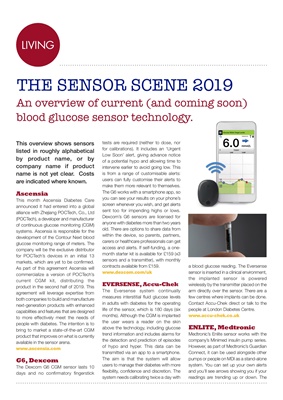
LIVINGLIVING
THE SENSOR SCENE 2019
An overview of current (and coming soon)
blood glucose sensor technology.
This overview shows sensors
listed in roughly alphabetical
by product name, or by
company name if product
name is not yet known. Cost
are indicated where known.
Ascensia
This month Ascensia Diabetes Care
announced it had entered into a global
alliance with Zhejiang POCTech, Co., Ltd
(POCTech), a developer and manufacturer
of continuous glucose monitoring (CGM)
systems. Ascensia is responsible for the
development of the Contour Next blood
glucose monitoring range of meters. The
company will be the exclusive distributor
for POCTech's devices in an initial 13
markets, which are yet to be confirmed.
As part of this agreement Ascensia will
commercialize a version of POCTech's
current CGM kit, distributing the
product in the second half of 2019. This
agreement will leverage expertise from
both companies to build and manufacture
next-generation products with enhanced
capabilities and features that are designed
to more effectively meet the needs of
people with diabetes. The intention is to
bring to market a state-of-the-art CGM
product that improves on what is currently.
www.ascensia.com
G6, Dexcom
The Dexcom G6 CGM sensor lasts
10 days and needs no confirmatory
fingersticks are required (neither to dose,
nor for calibrations). It includes an 'Urgent
Low Soon' alert, giving advance notice
of a potential hypo and allowing time to
intervene earlier to avoid going low. This
is from a range of customisable alerts:
users can fully customise their alerts to
make them more relevant to themselves.
The G6 works with a smartphone app, so
you can see your results on your phone's
screen whenever you wish, and get alerts
sent too for impending highs or lows.
Dexcom's G6 sensors are licensed for
anyone with diabetes more than two years
old. There are options to share data from
within the device, so parents, partners,
carers or healthcare professionals can get
access and alerts. A one-month starter
kit is available for £159 (x3 sensors and
a transmitter), with monthly contracts
available from £159.
www.dexcom.com/uk
EVERSENSE, Accu-Chek
The Eversense system continually
measures interstitial fluid glucose levels
in adults with diabetes for the operating
life of the sensor, which is 180 days (six
months). Although the CGM is implanted
the uses wears a reader on the skin
above the technology, including glucose
trend information and includes alarms for
the detection and prediction of episodes
of hypo and hyper. This data can be
transmitted via an app to a smartphone.
The aim is that the system will allow
users to manage their diabetes with more
flexibility, confidence and discretion. The
system needs calibrating twice a day with
a blood glucose reading. The Eversense
sensor is inserted in a clinical environment,
the implanted sensor is powered
wirelessly by the transmitter placed on the
arm directly over the sensor. There are a
few centres where implants can be done.
Contact Accu-Chek direct or talk to the
people at London Diabetes Centre.
www.accu-chek.co.uk
ENLITE, Medtronic
Medtronic's Enlite sensor works with the
company's Minimed insulin pump series.
However, as part of Medtronic's Guardian
Connect, it can be used alongside other
pumps or people on MDI as a stand-alone
system. You can set up your own alerts
and you'll see arrows showing you if your